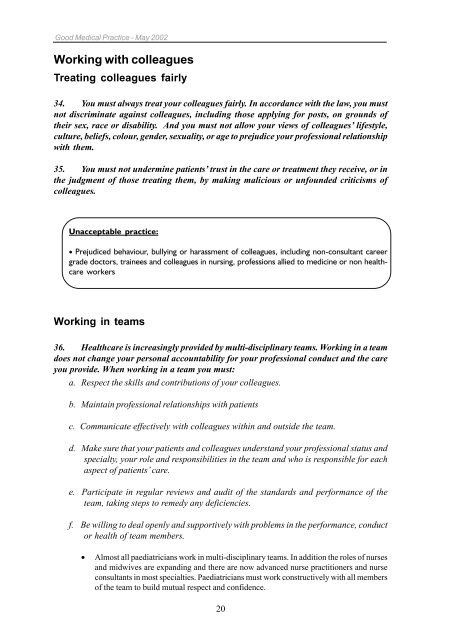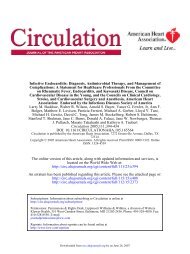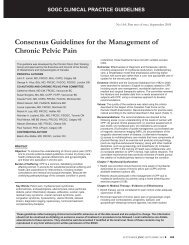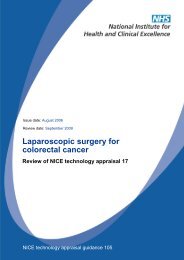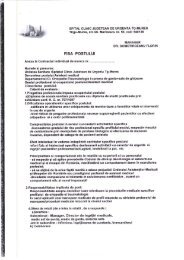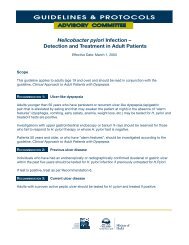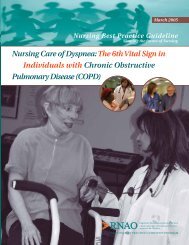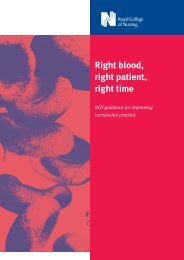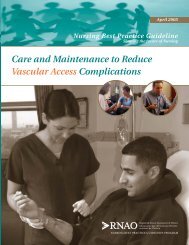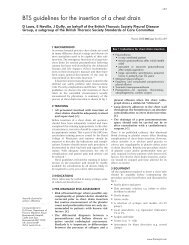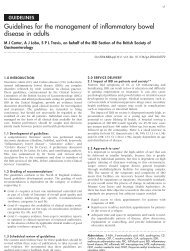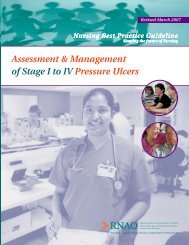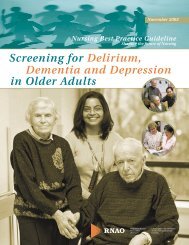Good Medical Practice in Paediatrics and Child Health
Good Medical Practice in Paediatrics and Child Health
Good Medical Practice in Paediatrics and Child Health
- No tags were found...
Create successful ePaper yourself
Turn your PDF publications into a flip-book with our unique Google optimized e-Paper software.
<strong>Good</strong> <strong>Medical</strong> <strong>Practice</strong> - May 2002Work<strong>in</strong>g with colleaguesTreat<strong>in</strong>g colleagues fairly34. You must always treat your colleagues fairly. In accordance with the law, you mustnot discrim<strong>in</strong>ate aga<strong>in</strong>st colleagues, <strong>in</strong>clud<strong>in</strong>g those apply<strong>in</strong>g for posts, on grounds oftheir sex, race or disability. And you must not allow your views of colleagues’ lifestyle,culture, beliefs, colour, gender, sexuality, or age to prejudice your professional relationshipwith them.35. You must not underm<strong>in</strong>e patients’ trust <strong>in</strong> the care or treatment they receive, or <strong>in</strong>the judgment of those treat<strong>in</strong>g them, by mak<strong>in</strong>g malicious or unfounded criticisms ofcolleagues.Unacceptable practice:• Prejudiced behaviour, bully<strong>in</strong>g or harassment of colleagues, <strong>in</strong>clud<strong>in</strong>g non-consultant careergrade doctors, tra<strong>in</strong>ees <strong>and</strong> colleagues <strong>in</strong> nurs<strong>in</strong>g, professions allied to medic<strong>in</strong>e or non healthcareworkersWork<strong>in</strong>g <strong>in</strong> teams36. <strong>Health</strong>care is <strong>in</strong>creas<strong>in</strong>gly provided by multi-discipl<strong>in</strong>ary teams. Work<strong>in</strong>g <strong>in</strong> a teamdoes not change your personal accountability for your professional conduct <strong>and</strong> the careyou provide. When work<strong>in</strong>g <strong>in</strong> a team you must:a. Respect the skills <strong>and</strong> contributions of your colleagues.b. Ma<strong>in</strong>ta<strong>in</strong> professional relationships with patientsc. Communicate effectively with colleagues with<strong>in</strong> <strong>and</strong> outside the team.d. Make sure that your patients <strong>and</strong> colleagues underst<strong>and</strong> your professional status <strong>and</strong>specialty, your role <strong>and</strong> responsibilities <strong>in</strong> the team <strong>and</strong> who is responsible for eachaspect of patients’ care.e. Participate <strong>in</strong> regular reviews <strong>and</strong> audit of the st<strong>and</strong>ards <strong>and</strong> performance of theteam, tak<strong>in</strong>g steps to remedy any deficiencies.f. Be will<strong>in</strong>g to deal openly <strong>and</strong> supportively with problems <strong>in</strong> the performance, conductor health of team members.• Almost all paediatricians work <strong>in</strong> multi-discipl<strong>in</strong>ary teams. In addition the roles of nurses<strong>and</strong> midwives are exp<strong>and</strong><strong>in</strong>g <strong>and</strong> there are now advanced nurse practitioners <strong>and</strong> nurseconsultants <strong>in</strong> most specialties. Paediatricians must work constructively with all membersof the team to build mutual respect <strong>and</strong> confidence.20


